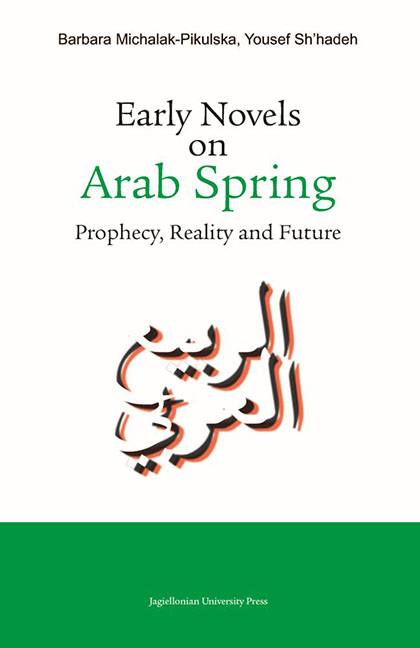Book contents
- Frontmatter
- Contents
- Introduction
- Part I Awakening of the Awareness of Subjugation – The Prophecy of the Spring of Nations in Arab Novels
- Part II At the Heart of the Arab Spring Events
- Part III The Future: The Spring Continues
- 17 Mu‘Taṣim Aš - Šā‘Ir : Uhzūǧat ar-raḥīl (A Song of Departure) and Fī intiẓār as-sulaḥfāt (Waiting for a Turtle)
- 18 Aḥmad ‘Abd Al - Malik : Al-Aqni‘a (Masks)
- 19 Ṭayba Aš - Šarīf Al - Idrīsī : Ḥaǧar min saqar (A Stone from Hell)
- 20 Amīra Aš - Širbīnī : ‘Itq (Liberation)
- 21 ‘ Izz Ad - Dīn Šukrī Fašīr : Bāb al-ẖurūǧ – risālat ‘Alī al-muf‘ama bi-bahǧa ġayr mutawaqqa‘a (The Gate to Leave – Ali’s Letter Filled with Unexpected Joy)
- Conclusion
- Bibliography
- Summary in Arabic
16 - ‘ Adnān Farzāt : Kāna ar-ra’īs ṣadīqī (The President Was My Friend)
Published online by Cambridge University Press: 13 October 2023
- Frontmatter
- Contents
- Introduction
- Part I Awakening of the Awareness of Subjugation – The Prophecy of the Spring of Nations in Arab Novels
- Part II At the Heart of the Arab Spring Events
- Part III The Future: The Spring Continues
- 17 Mu‘Taṣim Aš - Šā‘Ir : Uhzūǧat ar-raḥīl (A Song of Departure) and Fī intiẓār as-sulaḥfāt (Waiting for a Turtle)
- 18 Aḥmad ‘Abd Al - Malik : Al-Aqni‘a (Masks)
- 19 Ṭayba Aš - Šarīf Al - Idrīsī : Ḥaǧar min saqar (A Stone from Hell)
- 20 Amīra Aš - Širbīnī : ‘Itq (Liberation)
- 21 ‘ Izz Ad - Dīn Šukrī Fašīr : Bāb al-ẖurūǧ – risālat ‘Alī al-muf‘ama bi-bahǧa ġayr mutawaqqa‘a (The Gate to Leave – Ali’s Letter Filled with Unexpected Joy)
- Conclusion
- Bibliography
- Summary in Arabic
Summary
The essence of power seems to be always the same and always leads to selling out ideals, as whoever exercises it, ultimately succumbs to the baser instincts under its spell. Power unleashes hypocrisy in the rulers and kills any concern for society as such. Coups and revolutions do not alleviate conflicts for good, but they at least reverse the current balance of power for some time. Nonetheless, in the course of this struggle for freedom human degradation occurs and all moral values disappear – it might seem that revolutions do not improve the fate of man, and that they even lead to his destruction.
The main theme of ‘Adnān Farzāt’s novel is the political situation in Syria and the outbreak of the revolution against the Bashar al-Assad regime in 2011. The novel is the story of Nawras – the world-famous cartoonist and his friendship with the Syrian president. Although the novel does not mention the real names of the main characters, it is easy to guess that Nawras is ‘Alī Farzāt (brother of the book’s author), who is a world-famous caricaturist just like the character in the novel, and the other is president Bashar al-Assad. The novel is dedicated to Syria, a country that was the cradle of the first alphabet in the world; a country that is now changing the order of the alphabet so that its first letters form the word freedom.
The author shows the fate of three main characters: Rākān, Nawras and Nawwār. They all come from one city of Hama (Ḥamāh). Rākān is a military officer who intends to write diaries after retiring early. He has a guilty conscience, because without his consent he was transferred by his superiors to work in the security office. There he saw how the arrested citizens were tortured. Therefore, when the revolution breaks out, he stands on the side of the nation and dies at the hands of special forces of the Bashar regime. The man wanted to enter the academy of fine arts in his youth, but his father forced him to join the army, because he wanted his son to go down in history and take part in a coup.
- Type
- Chapter
- Information
- Early Novels on Arab SpringProphecy, Reality and Future, pp. 111 - 120Publisher: Jagiellonian University PressPrint publication year: 2022

